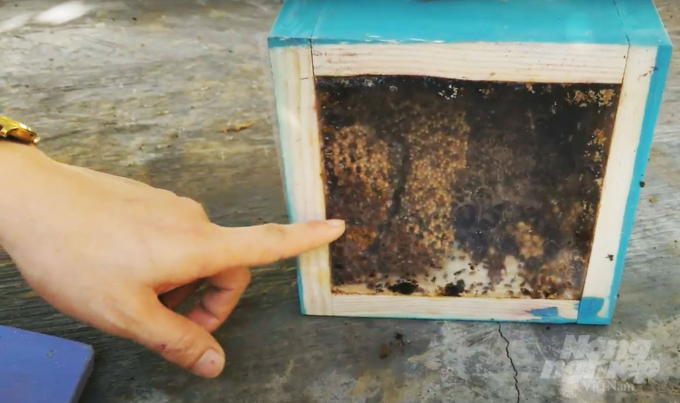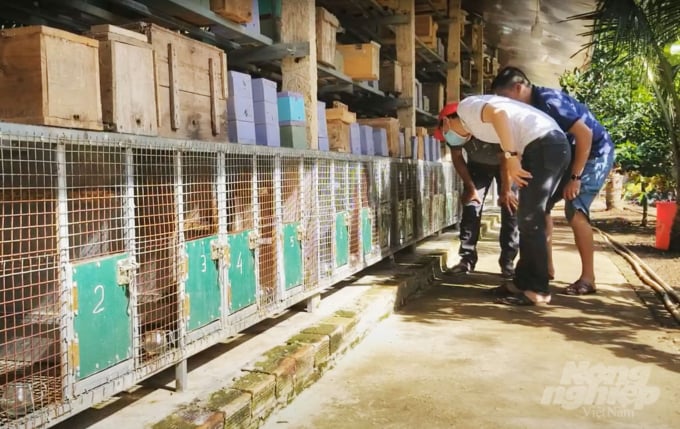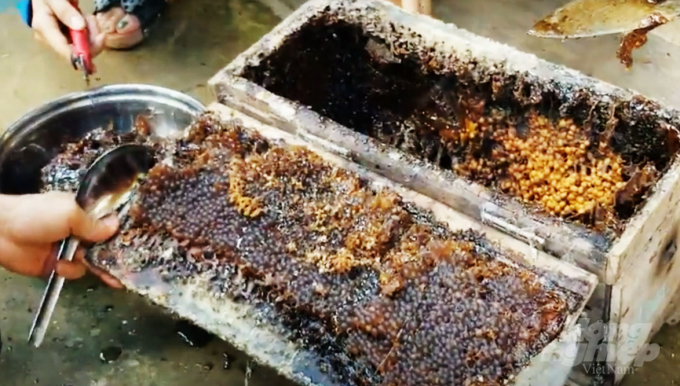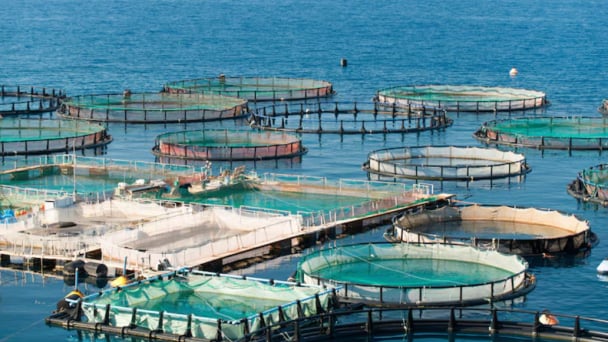June 4, 2025 | 17:23 GMT +7
June 4, 2025 | 17:23 GMT +7
Hotline: 0913.378.918
June 4, 2025 | 17:23 GMT +7
Hotline: 0913.378.918
We visit the family of Mr. Tran Van Thuc, hamlet 3, Duc Pho commune (Cat Tien district, Lam Dong), a pioneer in implementing the local stingless bee raising model. The first impression, when entering his 2-hectare garden full of rambutans, is the hundreds of wooden boxes hanging around the trees in the garden. While sharing with us, Mr. Thuc shows that he is very proud of his profession and his over 10 years of experience in beekeeping.

Mr. Tran Van Thuc hangs boxes of stingless bees in his family's rambutan garden. Photo: M.H.
According to Mr. Thuc, in 2008, his family let a friend who is a beekeeper bring bees to live in the garden, looking for flowers to suck nectar. When they left, he discovered a honeycomb inside a plastic pipe in the house. He took out the honey to try it out and found it very delicious, through research, he learned that the honey of stingless bee is a very rare type, so he was curious and decided to cut the pipe and take the honeycomb out to the garden to try raising it.
Nearly a year later, the bees grew well and produced a lot of honey. Since then, Mr. Thuc started researching and learning the farming process, about how to get honey reasonably and preserve honey products in a secure manner.
After more than 7 years of trial farming and research, by 2015, Mr. Thuc had finally succeeded in separating and breeding stingless bees.

The crate for stingless bees is compact and simple, the investment cost is not too high. Photo: M.H.
According to Mr. Thuc, raising stingless bees is not hard labor and does not cost much money because he does not have to worry about them getting fed or getting sick. However, bees are also very sensitive to changes in the environment such as hot, cold, sunny, and rainy weather that can make the bees sick.
Up until now, Mr. Thuc has developed a colony of stingless bees with the number of up to 170 swarms, and each year he collects about 150 liters of honey. With the current market price of VND 900,000 - 1,200,000/liter of honey, depending on the period, Mr. Thuc can earn more than VND 150 million a year. In addition, for each swarm of stingless bees after being successfully separated from the nest, he sells the seeds to other households for VND 1,500,000/swarm.

Stingless bee raising model of Mr. Do Van Nghia's family in Cat Tien town. Photo: M.H.
Similarly, Mr. Do Van Nghia, who lives in Residential group 15, Cat Tien town, has been raising stingless bees for honey for more than 7 years. However, instead of hanging the beehive on a tree, Mr. Nghia chose to build a firm house to create a stable "dwelling" for the bees.
In the raising process, Mr. Nghia gradually replaced the original crude bamboo and wooden trunks into small wooden boxes divided into many parts, one side covered with white plastic for easy observation and classification of egg layers, honey, and the number of bees. Moreover, collecting honey would not reduce the number of bees in a swarm.
At present, Mr. Nghia owns hundreds of bee swarms, possessing commercial stingless bee species, each year he harvests over 200 liters of honey, with a turnover of over VND 200 million.

Honey of stingless bee currently has a price of VND 900,000 - 1,200,000/liter, which signifies that the farmers are making high profits. Photo: M.H.
In order for this profession to develop in a stable and sustainable direction, in the coming time, the localities will establish a beekeeping club, giving members the opportunity to meet, exchange and share experiences. At the same time, farmers are encouraged to build brands, improve product quality, expand association scale in farming and proceed to develop OCOP-specified products to promote the popular local product.
“Stingless bee also has a queen bee like other bees, the special thing is that this kind of bee does not leave like micrapis or apis dorsata… when there are many “troops” in the colony, they separate into other swarm and so the number of nests is multiplied. The raising space can be placed under the porch, tree canopy, easily making use of many places in the garden, especially the bee is very friendly to people", said Mr. Do Nghia, living in Residential group 15, Cat Tien town.

(VAN) Technology is redrawing the map of Vietnamese aquaculture: more modern, greener, and more sustainable.

(VAN) Novel process harnesses machine learning to reveal groups of genes that determine how efficiently plants use nitrogen.

(VAN) Several scientists and farmers are experimenting with soil treatment in some key durian-growing regions such as Cai Lay (Tien Giang), Dak Song, Gia Nghia, and Dak R’lap (Dak Nong).
/2025/05/25/4127-3-073637_820.jpg)
(VAN) Thanks to the promotion from an FAO-implemented project, vegetable production in greenhouses in Moc Chau has seen strong development, from 1.5 hectares in 2021 to nearly 50 hectares in 2024.

(VAN) FAO has recently supported USD 140,000 to implement the project 'Risk mitigation human-animal interface risks through disease control initiatives in pig farming.'

(VAN) The People's Committee of Tra Vinh province has approved an adjustment to the investment policy for the Green Hydrogen Plant project, increasing its area to approximately 52.76 hectares.
![Reducing emissions from rice fields: [2] Farmers’ commitment to the soil](https://t.ex-cdn.com/nongnghiepmoitruong.vn/608w/files/news/2025/05/05/dsc08881jpg-nongnghiep-140632.jpg)
(VAN) Clean rice cultivation model in Thuong Tan commune, Bac Tan Uyen district, is assisting local residents in achieving sustainable agriculture by substantially reducing costs, increasing productivity, and protecting the environment.